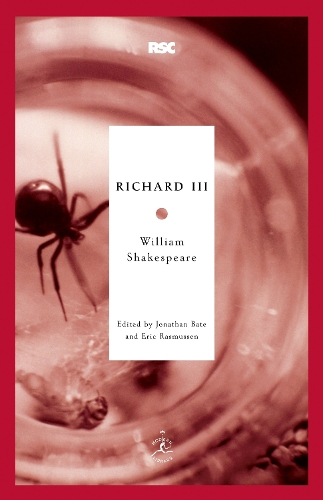
Richard III
(Paperback)
Available Formats
Paperback, New edition
Published: 18th February 2013
Paperback
Published: 1st February 2016
Paperback
Published: 1st July 1998
Paperback
Published: 15th November 2008
Paperback
Published: 28th August 2017
Paperback
Published: 8th August 2013
Publishing Details
Richard III
By (Author) William Shakespeare
Edited by Jonathan Bate
Edited by Eric Rasmussen
Random House USA Inc
Random House Inc
15th November 2008
United States
Classifications
General
Non Fiction
Other performing arts
812.54
Physical Properties
Paperback
272
Width 132mm, Height 203mm, Spine 15mm
214g
Description
The dramatic concluding months of The Wars of the Roses provide the setting for Shakespeares incomparable saga of power and intrigue.
Under the editorial supervision of Jonathan Bate and Eric Rasmussen, two of todays most accomplished Shakespearean scholars, this Modern Library series incorporates definitive texts and authoritative notes from William Shakespeare: Complete Works. Each play includes an Introduction as well as an overview of Shakespeares theatrical career; commentary on past and current productions based on interviews with leading directors, actors, and designers; scene-by-scene analysis; key facts about the work; a chronology of Shakespeares life and times; and black-and-white illustrations.
Ideal for students, theater professionals, and general readers, these modern and accessible editions set a new standard in Shakespearean literature for the twenty-first century.
Praise for William Shakespeare: Complete Works
A remarkable edition, one that makes Shakespeares extraordinary accomplishment more vivid than ever.
James Shapiro, professor, Columbia University, bestselling author of A Year in the Life of Shakespeare: 1599
Two eminent Shakespeareans . . . have applied modern editing techniques and recent scholarship to correct and update the First Folio. . . . Superb.
The New York Times
A feast of literary and historical information.
The Wall Street Journal
I look forward to using it over many years, enjoying Bates perceptive comments, trusting Rasmussens textual scholarship.
Peter Holland, president of the Shakespeare Association of America and editor of Shakespeare Survey
Author Bio
William Shakespeare was born in Stratford-upon-Avon in April 1564, and his birth is traditionally celebrated on April 23. The facts of his life, known from surviving documents, are sparse. He was one of eight children born to John Shakespeare, a merchant of some standing in his community. William probably went to the Kings New School in Stratford, but he had no university education. In November 1582, at the age of eighteen, he married Anne Hathaway, eight years his senior, who was pregnant with their first child, Susanna. She was born on May 26, 1583. Twins, a boy, Hamnet ( who would die at age eleven), and a girl, Judith, were born in 1585. By 1592 Shakespeare had gone to London working as an actor and already known as a playwright. A rival dramatist, Robert Greene, referred to him as an upstart crow, beautified with our feathers. Shakespeare became a principal shareholder and playwright of the successful acting troupe, the Lord Chamberlains Men (later under James I, called the Kings Men). In 1599 the Lord Chamberlains Men built and occupied the Globe Theater in Southwark near the Thames River. Here many of Shakespeares plays were performed by the most famous actors of his time, including Richard Burbage, Will Kempe, and Robert Armin. In addition to his 37 plays, Shakespeare had a hand in others, including Sir Thomas More and The Two Noble Kinsmen, and he wrote poems, including Venus and Adonis and The Rape of Lucrece. His 154 sonnets were published, probably without his authorization, in 1609. In 1611 or 1612 he gave up his lodgings in London and devoted more and more time to retirement in Stratford, though he continued writing such plays as The Tempest and Henry VII until about 1613. He died on April 23 1616, and was buried in Holy Trinity Church, Stratford. No collected edition of his plays was published during his life-time, but in 1623 two members of his acting company, John Heminges and Henry Condell, put together the great collection now called the First Folio.
